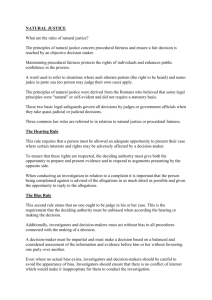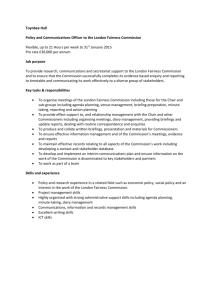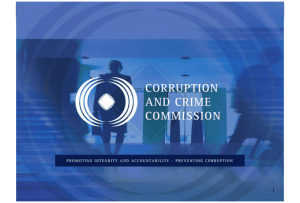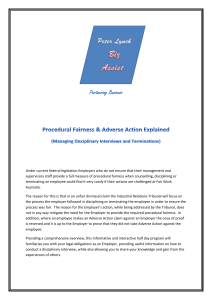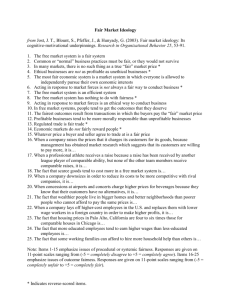What is procedural fairness? - Protective Security Policy Framework
advertisement
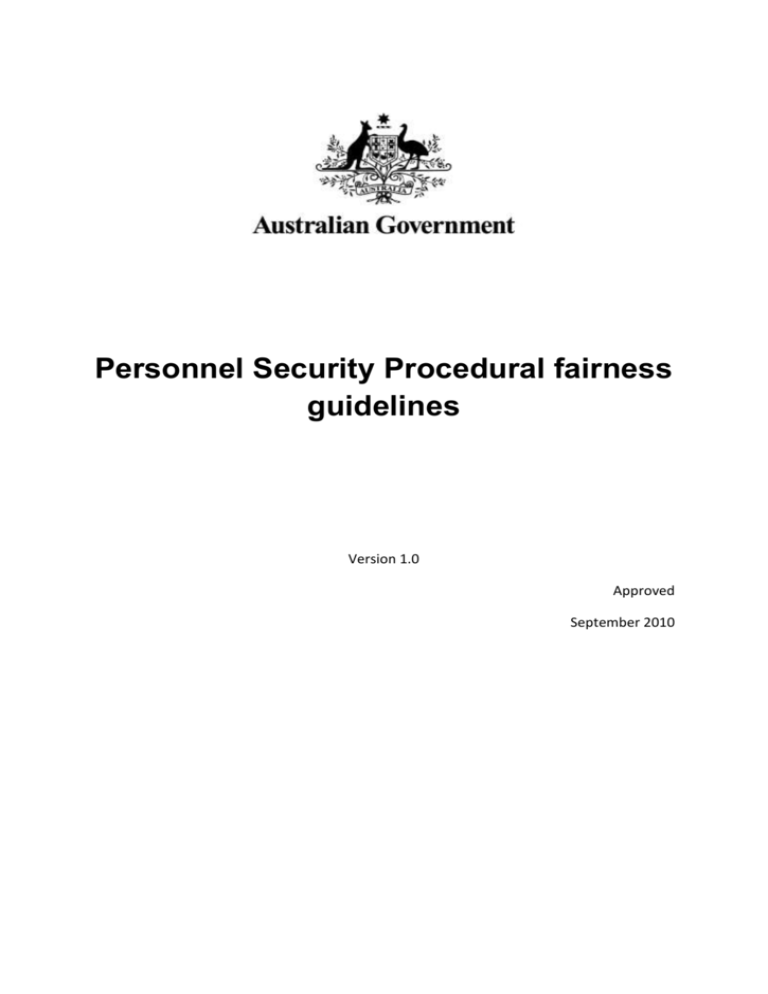
Personnel Security Procedural fairness guidelines Version 1.0 Approved September 2010 Contents What is procedural fairness? .............................................................................................................. 1 Is there a difference between natural justice and procedural fairness? ........................................ 1 Does procedural fairness apply to every government decision?........................................................ 1 What is ‘the hearing rule’?.................................................................................................................. 1 What is ‘the bias rule’? ....................................................................................................................... 2 How does procedural fairness apply to a clearance subject who may be negatively affected by a Delegate’s decision? ..................................................................................................... 3 How does procedural fairness apply to an assessing officer? ............................................................ 3 How does procedural fairness apply to the Delegate? ....................................................................... 5 i What is procedural fairness? Procedural fairness is concerned with the procedures used by a decision-maker, rather than the actual outcome reached. It requires a fair and proper procedure be used when making a decision. A decision-maker who follows a fair procedure is more likely to reach a fair and correct decision. Is there a difference between natural justice and procedural fairness? The term procedural fairness is thought to be preferable when referring to administrative decisionmaking because the term natural justice is associated with procedures used by courts of law. However, the terms have similar meaning and are commonly used interchangeably. For consistency, the term procedural fairness is used in these guidelines. Does procedural fairness apply to every government decision? No. The rules of procedural fairness do not need to be followed in all government decision-making. They mainly apply to decisions that negatively affect an existing interest of a person or corporation. For instance, procedural fairness would apply to a decision to: deny or vary a security clearance cancel a licence or benefit discipline an employee impose a penalty, or publish a report that damages a person’s reputation. Procedural fairness also applies where a person has a legitimate expectation. Procedural fairness protects legitimate expectations as well as legal rights. It is less likely to apply to routine administration and policy-making, or to decisions that initially give a benefit. In some rare circumstances, the requirement to provide procedural fairness is specifically excluded by Acts of Parliament. The rules of procedural fairness require: a hearing appropriate to the circumstances lack of bias evidence to support a decision, and inquiry into matters in dispute. What is ‘the hearing rule’? A critical part of procedural fairness is ‘the hearing rule’. Fairness demands that the clearance subject be told the case to be met, to the fullest extent possible consistent with national security, and be given the chance to reply before a Delegate makes a decision that could negatively affect the clearance subject. Put simply, hearing the other side of the story is critical to good decision-making. 1 In line with procedural fairness, the clearance subject has a right: to an opportunity to reply in a way that is appropriate for the circumstances for his/her reply to be received and considered before the decision is made to receive all relevant information before preparing his/her reply. The case to be met is to include a description of the possible decision, the criteria for making that decision and information on which any such decision would be based. It is most important that any negative information, to the fullest extent possible consistent with national security, the agency has about the clearance subject is disclosed to him/her. A summary of the information is sufficient; original documents and the identity of confidential sources do not have to be provided. Where there is a legal requirement not to disclose information that information cannot be provided to the clearance subject to a reasonable chance to consider their position and prepare a response. However, what is reasonable can vary according to the complexity of the issue, whether an urgent decision is essential or any other relevant matter, and to genuine consideration of any submission. The Delegate needs to be fully aware of everything written or said by the clearance subject, and give proper and genuine consideration to his/her case. What is ‘the bias rule’? The ‘bias rule’ or ‘rule against bias’ is a principle of procedural fairness which requires decision makers to: not have an interest in the matter being decided, and not appear to bring a biased or prejudiced mind to making the decision. ‘Bias’ does not have its ordinary negative meaning, rather it is used in the sense of a ‘predisposition towards’ or ‘a predilection’. The bias rule is based on the notion that courts, tribunals and other decision makers must be, and appear to be, impartial. Interest in matter decided The bias rule covers situations where the decision maker has a direct or indirect interest in the matter to be decided. The most obvious example of where a decision maker has an interest in the matter decided is where he or she has a pecuniary interest in the issue. Appearance of bias A decision maker must also not appear to be biased when making a decision. This does not require that actual bias arose in the decision making process. The test is whether a fair-minded observer might reasonably apprehend that the decision-maker might not bring an impartial mind to the resolution of the question. For example, disqualifying bias will occur where a fair minded observer might reasonably apprehend that the decision maker has pre-judged the matter by ignoring evidence or dismissing it for insufficient reason. 2 How does procedural fairness apply to a clearance subject who may be negatively affected by a Delegate’s decision? If a clearance subject is going to be negatively affected by a Delegate’s decision he/she is entitled to expect that the assessing officer and Delegate will follow the rules of procedural fairness before reaching a conclusion. In particular, the clearance subject is entitled to: be told the case to be met (for example, that an agency is considering denying or withdrawing a clearance, or imposing conditions on the clearance), including reasons for this proposal and any negative or prejudicial information relating to the clearance subject, to the fullest extent possible consistent with national security, that is to be used in the clearance process. The case to be met could be a letter or a draft report, or it could be a summary of the issues being considered by the assessing officer/Delegate. It is not necessary for the clearance subject to receive copies of all original documents or the identity of confidential sources be revealed, and a real chance to reply to the case to be met, whether that is in writing or orally. The type of hearing should be proportional to the nature of the decision. For instance, if the consequences of the proposed decision are highly significant, a formal hearing process may be warranted. In contrast, if the matter is relatively straightforward, a simple exchange of letters may be all that is needed. Generally, in any oral (or face-to-face) hearing, it is reasonable for the clearance subject to bring a friend or lawyer as a non-participating observer. In reply, the clearance subject may, among other things, wish to: deny the allegations provide evidence she/he believes disproves the allegations explain the allegations or present an innocent explanation provide details of any special circumstances she/he believe should be taken into account. She/he must be given a reasonable chance to respond before the decision is made, but after all important information has been gathered. This is so she/he can be given all the information she/he is entitled to and be aware of the issues being considered by the assessing officer/Delegate, and the assessing officer/Delegate should have an open mind (be free from bias) when reading or listening to what the clearance subject has to say. How does procedural fairness apply to an assessing officer? It is good practice for assessing officers to consider the requirements of procedural fairness at every stage of the clearance process, including: when undertaking a clearance assessment, and/ or preparing a report for a Delegate. 3 Procedural fairness is an essential part of a clearance process and benefits both the AGSVA (or exempt agency) and the clearance subject. An assessing officer, acting according to procedural fairness can be helped by providing: an important means of checking facts and identifying major issues comments made by the clearance subject that can expose weaknesses in the investigation, and/or advance warning of areas where the clearance report may be challenged. Depending on the circumstances, procedural fairness requires the assessing officer to: inform the clearance subject of the main points of any allegations or grounds for negative comment against him/her. How and when this is done depends on the circumstances and should be clearly defined in AGSVA (or exempt agency) policy. Where the concerns relate to psychological concerns the assessing officer is to consult with subject matter experts prior to communication the concerns to the clearance subject, and/or provide the clearance subject with a reasonable opportunity to put his/her case, whether in writing, at a hearing or otherwise. It is important to weigh all relevant circumstances for each individual case before deciding how the clearance subject should be allowed to respond to the allegations or negative comment. In most cases it is enough to give the clearance subject opportunity to put his/her case in writing. In others, however, procedural fairness requires the clearance subject to make oral representations. The ultimate decision will often need to balance a range of considerations, including the consequences of the decision. The assessing officer should: hear all parties to a matter and consider submissions make reasonable inquiries or investigations before making a decision. A decision that will negatively affect the clearance subject should not be based merely on suspicion, gossip or rumour. There must be facts or information to support all negative findings. The best way of testing the reliability or credibility of information is to disclose it to a clearance subject in advance of a decision, as required by the hearing rule only take into account relevant factors act fairly and without bias. If, in the course of a hearing, the clearance subject raises a new issue that questions or casts doubt on an issue that is central to a proper decision, it should not be ignored. Proper examination of all credible, relevant and disputed issues is important conduct the clearance process without unnecessary delay, and ensure that a full record of the clearance process has been made. Of course, wherever there is a requirement to apply particular procedures in addition to those that ensure procedural fairness, the terms of that statutory obligation must also be followed. 4 It is better practice that whenever it is proposed to make adverse comment about the clearance subject procedural fairness should be provided to him/her before the report is presented to the Delegate. There is no requirement that all the information in the assessing officer’s possession needs to be disclosed to the clearance subject. In rare cases, such as a serious risk to the national interest, personal safety or to substantial amounts of public funds, procedural fairness requirements may need to be circumvented due to overriding public interest. If the assessing officer believes this exists, expert advice should be sought and the case documented. How does procedural fairness apply to the Delegate? Except in rare circumstances where procedural fairness is excluded by statute, if a decision is made which will affect the rights, interests or legitimate expectations of the clearance subject, the Delegate must comply with the rules of procedural fairness. In other words, the Delegate must ensure she/he: allows the clearance subject a fair hearing (or verify that the clearance subject has been granted a fair hearing) that is neither too early or too late in the decision-making process, and is unbiased. This includes ensuring that from an onlooker’s perspective there is no reasonable perception of bias. For example, personal, financial or family relationships, evidence of a closed mind or participation in another role in the decision-making process (such as accuser or judge) can all give rise to a reasonable perception of bias. If this is the case, it is best the Delegate removes her/himself from the process and ensure an independent person assumes the role of Delegate. If the Delegate is relying on a briefing paper that summarises both sides of the case and makes a proposal, it is often a good idea to disclose a draft of the briefing paper to the clearance subject, even though a hearing has earlier been held. 5
